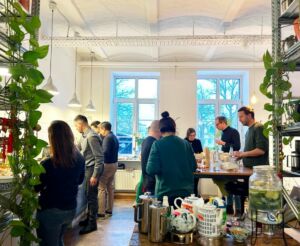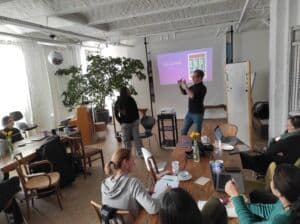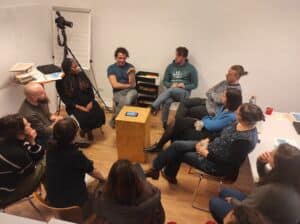Film, cook, think biodiversity! PLANET4B interventions training in Berlin
Biodiversity loss – along with climate change – is exacerbating, already having a severe impact on humanity. Continual deforestation has led to worsening air quality and reduced carbon storage, our depleted lands and oceans yield less and less food, public health is increasingly threatened by epidemics linked to contact with species that have lost their habitats, and our mental health deteriorates through being out of touch with nature. These impacts are worse on those that are already more vulnerable or directly rely on nature for their livelihoods. And yet, our current political and societal systems continue to prioritise or at least reproduce unsustainable and exploitative relations with the plants, animals and ecosystems we share our planet with.
To make our current decision-making more sustainable and generally more considerate towards others and nature, it is obvious we need to revisit our values and belief systems, that tend to shape what becomes a priority in our society. For this, we need, what we call ‘a transformative change’ at all levels – individual (what I think is important), community (what my community thinks is important), institutional (what our informal practices and norms and formal policies and regulations, but also overall systems think is important). As we want changes that are just and considerate, this transformation must be pursued in a manner that does not significantly harm the basic needs and opportunities to flourish, especially of those already vulnerable; rather, it should aim to empower people. For example, we should avoid interventions that solely introduce new fragmented policies or universally raise taxes, thereby shifting the problems elsewhere and hitting the already disadvantaged.
Our project, PLANET4B aims to contribute to this transformation by understanding better how we make decisions in relation to biodiversity and people, and how we can apply this understanding to improve biodiversity prioritisation in decision-making at all levels.
To address this need, PLANET4B has been working on intervention methods that go beyond conventional approaches (laws and regulations, markets and incentives, information) and can be piloted and implemented with the resources and capacities of the case studies involved in the project.
These methods include:
- creative, arts-based, deliberative methods (e.g. photo exhibition, participatory filmmaking);
- attention and framing experiments focusing on choice-architecture, social norms and emotions (e.g. nudges, reward system or invoking attachment to a local natural asset); and
- experiential learning games and debriefing (e.g. lab and field experiments where people can try different scenarios of decision-making around biodiversity and nature and experience consequences of their individual and group decisions in a simulated environment).
To learn about the potential of these interventions facilitating transformative change at various – individual to institutional – levels, PLANET4B organised an experiential training for its consortium partners, hosted by the Culture Goes Europe and led by the Martin Luther University Halle-Wittenberg and Coventry University. The training – held in Berlin, Germany, on 17-19 January 2024 – aimed to create space for experiencing and discussing transformative intervention methods, especially thinking of their practical deployment in case studies. The training was designed for project partners to learn both from the experts in the PLANET4B consortium and external experts, more about the three method sets above and to consider specifics of how these interventions can be applied in the local or sectoral contexts they are actively engaged in. The focus was on using non-conventional social interventions for improved biodiversity prioritisation, while taking into account intersectionality concerns such as power, inclusivity, communication, which made this training particularly unique.

Collective and experimental shopping and cooking challenge
Training in the basics of participatory filmmaking demonstrated how it can be a useful tool for supporting transformative change. A collective and experimental shopping and cooking challenge helped us understand the links between production, consumption, power and biodiversity. Rare introduced us to the key steps of a Behaviour-Centred Design in developing interventions with choice architecture, emotional appeal and social norms. There was also training in experiential games and the importance of well-designed debriefing for transforming experience into knowledge and action.

Interactive workshop
To the best knowledge of the organisers of the event, this was the first training focussing on non-conventional social interventions in the biodiversity domain that also included an intersectionality lens. Both the organisers and the participants found the training informative and inspiring, as it provided space for reflecting critically on each method, its fit for the individual case studies, potential barriers, risks and limitations. The event reinforced the confidence of the project team that the lessons from the upcoming implementation of the interventions will be of high relevance for increasing knowledge, as well as practical “know-how” on better prioritising biodiversity in decision-making at multiple – from individual to institutional – levels.

The games session
The next step in PLANET4B’s journey is to see how these methods will be applied in the project’s 11 case studies and how they can – as single interventions or in mixes – result in changes of biodiversity consideration in decisions by individuals and communities or across sectors.
To learn more about our case studies and their selected methods, click here.
To learn more about the non-conventional intervention methods PLANET4B collected through a literature review and partners’ contribution, click here.
To learn more about PLANET4B’s intervention training, click here
